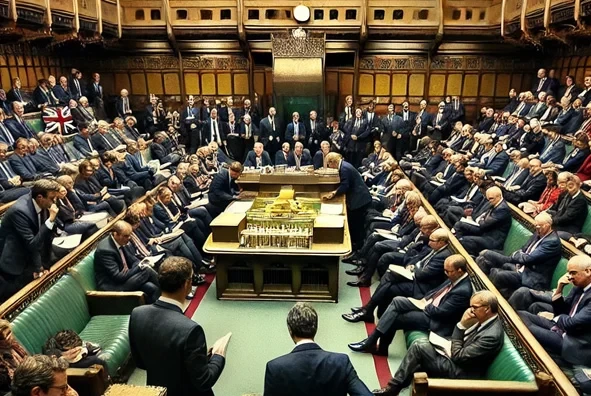Labour’s return to power after more than a decade of Conservative rule marked a pivotal moment in UK politics. With a carefully crafted, safe campaign, Labour secured a historic 157-seat majority, promising the public a new direction and a break from the economic and political challenges of the past. Labour’s manifesto promised to deliver tangible improvements in cost-of-living support, and healthcare reform, and to push forward progressive policies like sustainable energy solutions. Voters were eager for a new direction, with a particular emphasis on restoring public services like the NHS and delivering financial relief in the face of rising inflation and living costs. However, as we look back on Labour's first 100 days in power, the reality has been far from the transformational change many voters were expecting. From a series of political blunders to internal party divisions, these early months have left many voters feeling disillusioned. Could these early stumbles spell long-term trouble for the party, or will Labour be able to recover and build on their majority? Let’s examine the most significant issues faced by the government so far and consider whether the next steps might still provide hope for Labour’s future success.



Right out of the gate, Labour has encountered several bumps in the road. One of the biggest issues has been the uproar over “freebie-gate,” where accusations of cronyism have surfaced. This has really put a dent in Labour’s image as a party that stands for integrity and transparency—something they promised to uphold after years of Conservative rule.
The controversy surrounding donations and gifts accepted by Prime Minister Keir Starmer has captured public attention. Reports reveal that Starmer accepted gifts valued at over £100,000 during the past five years, including expensive accommodations and designer items. This raises questions about accountability and ethical governance, especially when many citizens are grappling with rising living costs. The perception that Labour is engaging in similar practices to previous administrations has disillusioned many.
Then there’s the decision to means-test winter fuel payments. This move hasn’t sat well with many people; a staggering 55% of Britons disapprove of it. It feels like a misstep that could easily have been avoided, especially when so many are struggling with rising costs.
It’s clear from recent polls that public sentiment is pretty grim. A YouGov survey shows that 59% of people disapprove of Labour's performance so far. Even among Labour supporters, nearly half feel let down. That’s tough to swallow for a party that came in with high expectations.
But it’s not all bad news. Some policies have received a warm reception. For instance, Labour managed to negotiate new pay deals with junior doctors, which 61% of the public supports. They’ve also lifted the ban on new onshore wind farms and suspended arms sales to Israel—both moves that have found favour with over half of Britons.
Polling data reveals a stark divide in public opinion. While some policies have garnered support—like the new pay deal for junior doctors—others have sparked outrage. The disapproval ratings for decisions like means-testing winter fuel payments and releasing some prisoners early are telling indicators of how quickly public opinion can shift.
Despite the controversies, some actions have received positive feedback from the public. Labour successfully negotiated new pay deals with junior doctors—a move supported by 61% of respondents in recent polls. This is an important win for the government, especially in light of ongoing strikes and unrest within the NHS.
Here’s a quick look at what’s working and what isn’t:
Wins:
Losses:
Another layer complicating Labour's early days is internal strife within the party itself. Starmer faces challenges from various factions within Labour—some pushing for more progressive policies while others advocate for centrist approaches. This tension can lead to mixed messaging and confusion about the party's direction.
For any political party, unity is crucial—especially during challenging times. If factions within Labour continue to clash publicly, it could further erode public trust and create an impression of disarray at a time when decisive leadership is essential.
Labour faces significant economic challenges as it seeks to stabilize public sentiment and regain trust. With inflation rates still high and living costs rising sharply, voters are looking for immediate relief measures that resonate with their daily struggles.
To address these economic concerns effectively, Labour must prioritize policies that directly impact households—such as energy cost relief and support for low-income families. The upcoming budget announcement will be crucial in outlining how Labour plans to tackle these pressing issues while balancing fiscal responsibility.
Understanding how Labour's policies affect key demographics will be essential for regaining public support. Voters in regions heavily impacted by austerity measures or those reliant on social services may feel particularly disenfranchised if their needs are not addressed promptly.
Additionally, engaging younger voters who are increasingly concerned about climate change and social justice could prove vital for Labour's long-term strategy. Policies aimed at sustainability and equity may resonate well if effectively communicated.
Despite the rocky start, there might still be hope for Labour. Keir Starmer's popularity has taken a hit—63% of people view him unfavourably—but many voters seem willing to give him some grace. After all, expecting miracles in just 100 days is a tall order.
Tim Bale, a politics professor, pointed out that this could be one of the worst starts for any government in recent memory. Yet he also reminds us that political tides can turn quickly. The upcoming budget announcement on October 30 could be a pivotal moment for Labour—a chance to reset and regain public trust.
Political analyst Tim Bale noted that this period represents "the worst beginning for a government in living memory." However, he also emphasizes that political landscapes can shift rapidly based on effective policy implementation and communication strategies.
The upcoming budget announcement on October 30 could serve as a pivotal moment for Labour—a chance to reset its narrative and regain public trust. How they handle this announcement will be critical in shaping their future trajectory.
Chancellor Rachel Reeves faces immense pressure as she prepares for this budget presentation. Speculation suggests potential tax increases alongside commitments made during the election campaign, including VAT on private school fees 5. The balance between fiscal responsibility and social equity will be crucial as she navigates these waters.

As we reflect on Labour's first 100 days in power, it’s clear that while the challenges have been significant, opportunities for recovery and growth still exist. The party must learn from its early missteps and effectively communicate its vision to regain public trust. With pressing issues like economic stability and social welfare at the forefront, Labour has a crucial task ahead: to implement policies that resonate with everyday people and address their concerns.
The upcoming budget announcement on October 30 will be a pivotal moment, offering Labour a chance to reset its narrative and demonstrate its commitment to the electorate. If they can navigate these challenges thoughtfully and decisively, there remains potential for a turnaround before the next election. Ultimately, the road ahead is fraught with obstacles, but with strategic action and clear communication, Labour can still win back the hearts and minds of the British public.
NOTE: This blog was written by the specialists at 88gravity, a leading branding agency dedicated to exploring global political narratives and empowering brands through innovative digital strategies.




